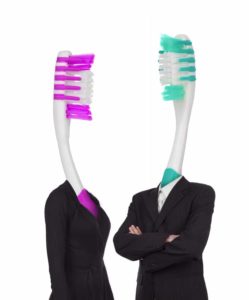
For the most part, common dental issues can be prevented with proper, consistent use of your toothbrush. Yet, the state of your toothbrush can determine how effective it is at cleaning and protecting your teeth. Learn proper toothbrush care. If you don’t care for it well, your toothbrush may cause more harm than good to your teeth and soft gingival tissues (gums). Make sure you’re taking good care of your toothbrush by following a few guidelines from your friendly neighborhood dentist!
Many patients inquire about how they should take care of their toothbrushes. For our patients wondering about toothbrush replacement and storage guidelines, our staff answers commonly asked questions below that are in accordance with the American Dental Association’s guidelines.
Toothbrush care: Should I buy a special solution to sanitize my brush?
At the least, we recommend that you wash your toothbrush with warm tap water after each use and remove any remnants of toothpaste. The ADA states this is an efficient way to keep your brush clean between replacements. Special sanitizing solutions are not necessary. Some patients choose to soak their brush in antiseptic mouthwash for thirty minutes; however, this is a personal choice. To be on the safe side, avoid sharing a toothbrush with anyone else—including family.
How Often Should I Replace My Toothbrush?
We recommend that you replace your toothbrush at least every three to four months. However, you should inspect your toothbrush every few weeks to check if it is worn out. If your bristles are frayed you should replace your toothbrush.
Should I Place My Toothbrush in a Special Container?
This depends on your circumstance. If you are at home, it is best to leave your toothbrush in an upright position. You want your toothbrush to dry completely in between uses so avoid placing your brush in a closed container. Closed containers create a moist environment that bacteria thrive in. However, if you are traveling, the ADA recommends that the best toothbrush care is to keep your brush in a travel container with small holes in it.
What Type of Toothbrush Should I Buy?
We recommend that you purchase a soft-bristled brush with the ADA seal of approval. The packaging will indicate whether or not the brush is ADA accepted.
Using Your Toothbrush
- The first step to good toothbrush care begins at the store where you buy it. Be sure to choose a soft-bristled toothbrush with the American Dental Association (ADA) Seal of Acceptance on its package. Harsher bristles, such as those advertised as animal hair brushes, can scrape away weakened enamel—the protective layer of minerals around your teeth—and leave your teeth vulnerable to bacteria and tooth decay.
- Spot-brushing only the parts of your teeth that look or feel grimy will not adequately clean your teeth. You may not always feel dental plaque (a byproduct of oral bacteria), and if you neglect to brush it away, it can calcify (harden) into tartar. Once calcified, tartar can’t be removed with your toothbrush, and your risk of developing cavities and gum disease increases exponentially.
- The frequency with which you brush your teeth is also a vital aspect of good dental health. We recommend brushing and flossing at least twice every day to keep up with the pace of plaque accumulation. When possible, brush your teeth 20-30 minutes after eating, as well.
Storing Your Toothbrush with Care
- Some dentists suggest soaking your toothbrush in special toothbrush sanitizers. We suggest that after you use it, rinse it off and store your toothbrush upright in the open air to dry further. Be sure not to seal the brush in a holder with wet bristles. The moisture and lack of oxygen can create a hospitable environment for fungi and bacteria to develop on your toothbrush’s bristles. Thoroughly dry your toothbrush after every use. If you use a brush holder, and leave the cap slightly open to allow air to flow through.
- Store your toothbrush as far away from the toilet as possible to avoid cross-contamination. Also, wash your hands before picking up your toothbrush to prevent germs from migrating to the brush and bristles.
- Over time, your toothbrush will lose its effectiveness as its bristles become worn and frayed. To keep your brush performing at its finest, change it at least once every three months, or as soon as the bristles show noticeable signs of wear and tear.
Learn more about toothbrush care and the best hygiene habits
To schedule an appointment with Dr. James Fondriest, contact Chicago dentist office at (847) 234-0517. We serve patients from Lake Forest, North Shore, and the surrounding Chicago neighborhoods.
